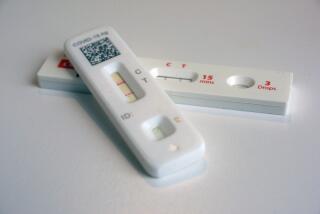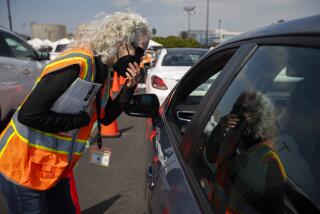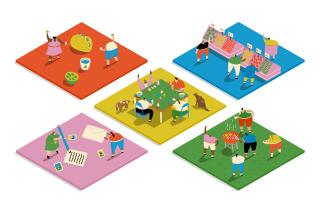OK, so things are relaxing a bit. How do you decide who to let into your COVID bubble?
- Share via
I live alone in New York City, and the only human I have had contact with since COVID imprisoned us all in place is my best friend, Herb, who comes over for dinner. We are both older and therefore at risk and quarantine-wise, we are in harmony. We see only one another, we do not go out without masks and, when sheltering in place finally ends, we have the same plan on when to return to movies and restaurants, which is never.
But I see a problem ahead. Close friends and I have started discussing Add-Ons, as in:
“If you’re not seeing anyone but Herb, and I’m not seeing anyone but my husband, what would be wrong with us meeting in the park and sitting six feet apart and having a sandwich? Or you could come up to my place, wash your hands, sit on the couch and I would make you a cup of coffee. In fact, I could make us dinner. Why not? Nobody is sick here.”
This sounds pretty good to me until I remember: My friend’s 31-year-old kid has been living with her.
“What about your daughter?” I say.
“She’s staying with her boyfriend in New Jersey.”
This could work. Rather than sitting on my couch all day, I could be sitting on my friend’s couch. It would be a little patch of normal. Then I remember something else. In this very conversation my friend said she had gone to a coffee shop that morning and ordered a turkey sandwich to go and was not in the least bit nervous. I, on the other hand, am nervous just hearing about it.
You see the problem: My friend and I have different levels of COVID anxiety. And if her kid were still living with her, my anxiety would be even worse. I’d have to do an extended investigation: Is your daughter wearing a mask when she goes out? Is she hanging out with anyone? Are you sure she’s telling the truth?
When sheltering in place began, I thought that the big lie on OkCupid would shift from “slim and fit” to “tested positive for antibodies.” Now, though, no one is certain antibodies guarantee immunity.
As sheltering-in-place guidelines ease, we will all have to decide who it is safe to socialize with. And that may mean submitting the people we love to off-putting interrogations. It’s like discussing sexually transmitted disease.
“OK, you’ve only been with your partner. But how do you know what he’s been up to? Didn’t you say he made a bakery run for babka the other day? How do you know it wasn’t an open-rack bakery? Do have any idea how many people could have been breathing on that babka while they’re making up their minds?”
There is a lot of interest these days about the New Zealand bubble model, which was used there with great success to beat back COVID. It works like this: A single person or couple can socialize with one or two people outside their household provided those people see only them. You get the level of commitment this would take? It’s the horror of dating compounded — four adults have to commit to being exclusive.
“We swear to have dinner only in one another’s apartments and take drives in the country with only one another, till a proven COVID vaccination, which will take at least a year to develop, us do part. If you get too annoying, we’ll break up with you and find another couple.”
My own COVID standards happen to be exemplary. I took my first drive in the country last weekend, and before gassing up I put on medical gloves and washed the surface of the pump with a sanitary wipe. After paying, I sterilized my credit card with a fresh wipe. Then I threw away my gloves and disinfected my hands and bag with a hand sanitizer. Then I checked to see if there were any drivers behind me who needed surgery.
But how many people out there behave exactly the way I do? How do I figure out if I’m comfortable enough with their behavior to make them my exclusive COVID buddies without handing them a questionnaire? Already, friends are admitting to behavior I’m not crazy about: visiting a daughter and son-in-law, whose secretary’s husband had COVID. How many degrees of COVID separation is that? Are these people even bubble aware? Say one or more of them is a dread silent carrier. With a three- to 10-day incubation period, the plus-one at dinner could be Mr. COVID, who we all know by now is the worst kind of player.
Hey, baby, why don’t you sit next to me and take a taste of this burrata? You get out much? I don’t think I’ve seen you around. What would you say to a nightcap? And a ventilator.
Perfect as my COVID avoidance habits are, let’s say I’m in a committed bubble with three adults and want to do something borderline — stop at my favorite upstate hot dog stand, situated outside a busy shopping mall and manned by teenagers, who aren’t known for their sense of civic responsibility. Do I have to first call my bubble mates to discuss risk? What if one of them doesn’t want me to get that hot dog, to me the very embodiment of summer delights? Do I get it anyway and then lie, break my sacred bubble vows, infect my friends and single-handedly send New York City into the Second Wave?
I look forward to the speedy development of that COVID vaccine.
Joyce Wadler is a New York journalist.
More to Read
A cure for the common opinion
Get thought-provoking perspectives with our weekly newsletter.
You may occasionally receive promotional content from the Los Angeles Times.









